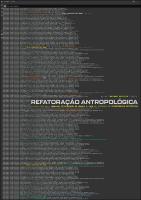| ???jsp.display-item.social.title??? |


|
Please use this identifier to cite or link to this item:
https://tede.ufam.edu.br/handle/tede/11188| ???metadata.dc.type???: | Tese |
| Title: | Refatoração Antropológica: proposições para repensar diversidade de gênero e raça em sistemas de Inteligência Artificial |
| Other Titles: | Anthropological Refactoring: propositions for rethinking gender and race diversity in Artificial Intelligence systems |
| ???metadata.dc.creator???: | Lima, Mayane Batista  |
| ???metadata.dc.contributor.advisor1???: | Cardoso, Thiago Mota |
| First advisor-co: | Marras, Stelio Alessandro |
| ???metadata.dc.contributor.referee1???: | Flores, Luiza Dias |
| ???metadata.dc.contributor.referee2???: | Rufino, Márcia Regina Calderipe Farias |
| ???metadata.dc.contributor.referee3???: | Silva, Carolina Parreiras |
| ???metadata.dc.contributor.referee4???: | Ferreira, Glauco Batista |
| ???metadata.dc.description.resumo???: | Esta pesquisa é uma tentativa de pensar a máquina de análise facial DeepFace como um código-interlocutor, um esforço para expor a topologia invisível das infraestruturas algorítmicas, aquilo que permanece recalcado sob a superfície da interface, onde os processos de decisão estão no dado e o dado-a-ver, entre corpos e sua codificação. Partindo da problematização da invisibilidade das camadas de decisão, a pesquisa analisou como atributos fenotípicos e identitários são capturados, classificados e transformados em variáveis numéricas manipuláveis pela análise facial. O objetivo foi investigar os processos pelos quais subjetividades humanas são transpostas em parâmetros técnico-computacionais nos sistemas de análise facial baseados em inteligência artificial, como o DeepFace. A pesquisa se constitui em uma etnografia da ciência e da tecnologia em laboratórios de inteligência artificial, grupos de estudo em IA, análise de código, observação participante em oficinas de linguagem de programação e hackathons, com base na abordagem etnográfica de Hess (2001) e Forsythe (1993, 2001). Como contribuição conceitual, propus a Refatoração Antropológica (RANT), entendida menos como remediação técnica e mais como gesto de desautomatização dos processos classificatórios, que se materializaram na elaboração do algoritmo DAI (Diversity in Artificial Intelligence). Este, concebido como contraponto aos vieses do DeepFace, visava instaurar a equidade em termos de gênero e raça na tecnologia, mas acabou por especializar-se em colorismo (Devulsky, 2021), demonstrando que, mesmo quando se tenta equilibrar matematicamente os vieses, a balança pesa para outro lado, ou seja, não há equidade na balança interna dos algoritmos. Mais do que buscar respostas definitivas, o que se oferece aqui é uma provocação, um convite a pensar o que significa ensinar uma máquina a ver, a reconhecer, a classificar, interrogando sobre os mundos que estamos codificando, as corpas que estamos traduzindo em vetores numéricos e os futuros que, linha por linha, estamos, consciente ou inconscientemente programando. |
| Abstract: | This research is an attempt to conceive the facial analysis machine DeepFace as a code-interlocutor, an effort to expose the invisible topology of algorithmic infrastructures, that which remains repressed beneath the surface of the interface, where decision processes are inscribed in the data and in the data-to-be-seen, between bodies and their codification. Starting from the problematization of the invisibility of decision layers, the research analyzed how phenotypic and identity attributes are captured, classified, and transformed into numerical variables manipulable by facial analysis. The aim was to investigate the processes through which human subjectivities are transposed into technical-computational parameters in artificial intelligence–based facial analysis systems such as DeepFace. The research is constituted as an ethnography of science and technology within artificial intelligence laboratories, AI study groups, code analysis, participant observation in programming language workshops and hackathons, drawing on the ethnographic approach of Hess (2001) and Forsythe (1993, 2001). As a conceptual contribution, I proposed the Anthropological Refactoring (RANT), understood less as a technical remediation and more as a gesture of de-automatization of classificatory processes, which materialized in the development of the DAI (Diversity in Artificial Intelligence) algorithm. Conceived as a counterpoint to the biases of DeepFace, it aimed to establish equity in terms of gender and race within technology, but ended up specializing in colorism (Devulsky, 2021), demonstrating that even when mathematical attempts are made to balance biases, the scale tips to another side; in other words, there is no equity in the internal balance of algorithms. More than seeking definitive answers, what is offered here is a provocation, an invitation to reflect on what it means to teach a machine to see, to recognize, to classify, interrogating the worlds we are coding, the bodies we are translating into numerical vectors, and the futures that, line by line, we are consciously or unconsciously programming. |
| Keywords: | Reconhecimento facial (Computação) Inteligência artificial - Aspectos sociais |
| ???metadata.dc.subject.cnpq???: | CIENCIAS HUMANAS: ANTROPOLOGIA: TEORIA ANTROPOLOGICA |
| ???metadata.dc.subject.user???: | Inteligência artificial Análise facial Visão computacional Raça-gênero e tecnologia Refatoração antropológica |
| Language: | por |
| ???metadata.dc.publisher.country???: | Brasil |
| Publisher: | Universidade Federal do Amazonas |
| ???metadata.dc.publisher.initials???: | UFAM |
| ???metadata.dc.publisher.department???: | Instituto de Filosofia, Ciências Humanas e Sociais |
| ???metadata.dc.publisher.program???: | Programa de Pós-graduação em Antropologia Social |
| Citation: | LIMA, Mayane Batista. Refatoração Antropológica: proposições para repensar diversidade de gênero e raça em sistemas de Inteligência Artificial. 2025. 273 f. Tese (Doutorado em Antropologia Social) - Universidade Federal do Amazonas, Manaus (AM), 2025. |
| ???metadata.dc.rights???: | Acesso Aberto |
| ???metadata.dc.rights.uri???: | https://creativecommons.org/licenses/by-nc-nd/4.0/ |
| URI: | https://tede.ufam.edu.br/handle/tede/11188 |
| Issue Date: | 30-Jun-2025 |
| Appears in Collections: | Doutorado em Antropologia Social |
Files in This Item:
| File | Description | Size | Format | |
|---|---|---|---|---|
| TESE_MayaneLima_PPGAS | 9 MB | Adobe PDF |  Download/Open Preview |
Items in DSpace are protected by copyright, with all rights reserved, unless otherwise indicated.




